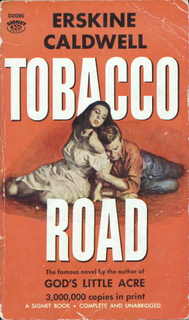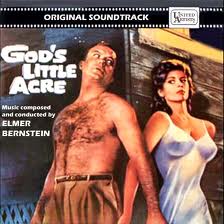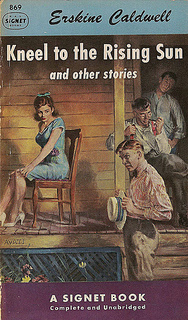
photo by Graveur8x
by Ellie Piddington
On his death, from lung cancer on 11th April, 1987, Caldwell had published twenty-five novels, nearly one-hundred-and-fifty short stories and twelve volumes of non-fiction. He had extensive first-hand knowledge of the South, with an interest in class unparallel by his contemporaries. However, he is frequently viewed as a writer who lacked artistic discipline, publishing too much, too quickly.
Today, he is often excluded from the canon of twentieth-century Southern writers; he is also noticeably absent from literary anthologies, and few readers other than specialists in Southern literature are likely to be familiar with his work. Furthermore, his skill as a short story writer is frequently eclipsed by violence, depravity and sexual explicitness of his work. His novella, Poor Fool (1930), includes characters such as the four-hundred-pound abortionist Mrs. Boxx, her castrated husband, and her simultaneously comic and sinister homosexual henchman, Jackie. His novel, Tobacco Road (1931) includes a scene in which a poor sharecropper’s daughter, Ellie-May, disfigured by a harelip, seduces her brother-in-law in order to steal his sack of turnips, whilst her family watch them roll in the sand like ‘tumble-bugs.’
 In Caldwell’s commitment to depicting neglected Southern victims of the Depression, in positions of poverty – ‘poor whites’ and sharecroppers – both physical and social outcasts, his contemporary, Donald Davidson felt Caldwell had betrayed ‘regional loyalties.’ He suggested Caldwell catered for left-wing Marxists and Communists in exploring Southern racial violence and class (a Leftist concern). Importantly, Caldwell can be seen as not betraying regional loyalties, but re-defining what regional loyalties are. For example, in Caldwell’s fiction the African American is morally elevated above the ‘poor whites.’ Two of Caldwell’s most potent and thought-provoking stories concerning race and class are “Kneel to the Rising Sun” (1935) and “Candyman Beechum” (1940). The reader never finds the mulatto ‘idiot’ seen in Faulkner’s work.
In Caldwell’s commitment to depicting neglected Southern victims of the Depression, in positions of poverty – ‘poor whites’ and sharecroppers – both physical and social outcasts, his contemporary, Donald Davidson felt Caldwell had betrayed ‘regional loyalties.’ He suggested Caldwell catered for left-wing Marxists and Communists in exploring Southern racial violence and class (a Leftist concern). Importantly, Caldwell can be seen as not betraying regional loyalties, but re-defining what regional loyalties are. For example, in Caldwell’s fiction the African American is morally elevated above the ‘poor whites.’ Two of Caldwell’s most potent and thought-provoking stories concerning race and class are “Kneel to the Rising Sun” (1935) and “Candyman Beechum” (1940). The reader never finds the mulatto ‘idiot’ seen in Faulkner’s work.
Erksine Caldwell was born on 17th December 1903 in a small community of White Oak, Georgia. He was the only child of schoolteacher, Caroline Bell, and Presbyterian minister, Ira Sylvester Caldwell. His father’s work as a nominal official caused the Caldwell’s to travel a great deal, and Caldwell grew up in Georgia, the Carolinas, Florida and Tennessee. The young Caldwell accompanied his father on visits to poor tenant farmers, which was to become a lasting influence on the writer’s work.
As a young man, he worked in Atlanta, Memphis, New Orleans, Philadelphia, and Baltimore as, among other jobs, a mill labourer, farmhand, cotton picker, and stagehand in a burlesque house. In 1925 he left the University of Virginia to become a reporter for the Atlanta Journal, and he married the first of his four wives. After attending three colleges he failed to obtain a degree, but at the University of Virginia, before his twenty-third birthday, his essay “The Georgia Cracker” was published in the Haldeman-Julis Monthly (1926). This work introduced themes of racial bigotry and his native state’s narcissism, which would characterise his future writing (‘So this is Georgia – whose inhabitants do cruel and uncivilized things; whose land is overrun with bogus religionists, boosters, and demagogues’).
After numerous rejections, he began to publish short stories in magazines which would constitute his first short story collection American Earth (1931). His prolific career as an author was launched by his two novellas, The Bastard (1929) and Poor Fool (1930). Yet he is most well-known for Tobacco Road (1933) and God’s Little Acre (1934). Both books initially sold badly, until Tobacco Road gained wider attention as a Broadway play, and God’s Little Acre increased in popularity after obscenity charges were brought against it.
which would constitute his first short story collection American Earth (1931). His prolific career as an author was launched by his two novellas, The Bastard (1929) and Poor Fool (1930). Yet he is most well-known for Tobacco Road (1933) and God’s Little Acre (1934). Both books initially sold badly, until Tobacco Road gained wider attention as a Broadway play, and God’s Little Acre increased in popularity after obscenity charges were brought against it.
After the 1930s the quality of his work declined, or to quote William Faulkner, ‘It gradually grew towards trash.’ It became, as Edwin T. Arnold comments in Erskine Caldwell Reconsidered (1990), mechanical, repetitive and shocking for the sake of shock alone.
 However, unlike critical responses to his novels, his short stories earned consistent critical praise from his peers. Milton Rugoff of The New York Herald Tribune (1940) called Caldwell a ‘natural’ short story writer. H.E. Bates placed Caldwell in a canon of great Southern short story writers, including William Faulkner and Katherine Anne Porter. More recently, Caldwell scholar Scott MacDonald suggests Caldwell’s stories ‘may be the simplest effective stories in American literature.’ Arguably, it is his Kneel to the Rising Sun and Other Short Stories (1935) which contains some of his best work. Caldwell scholar Wayne Nixon suggests this collection comprises ‘some of the finest work ever written by one of America’s greatest writers.’
However, unlike critical responses to his novels, his short stories earned consistent critical praise from his peers. Milton Rugoff of The New York Herald Tribune (1940) called Caldwell a ‘natural’ short story writer. H.E. Bates placed Caldwell in a canon of great Southern short story writers, including William Faulkner and Katherine Anne Porter. More recently, Caldwell scholar Scott MacDonald suggests Caldwell’s stories ‘may be the simplest effective stories in American literature.’ Arguably, it is his Kneel to the Rising Sun and Other Short Stories (1935) which contains some of his best work. Caldwell scholar Wayne Nixon suggests this collection comprises ‘some of the finest work ever written by one of America’s greatest writers.’
Even by today’s standards his work is shocking, unsettling and provoking. In his fiction, an old man falls into a pigpen and is eaten by hogs; men are lynched and tortured; people are burnt with turpentine, mutilated and crushed; the tails of dogs are cut off and kept in a trunk. However, Caldwell’s impact on the literary community surely stems from the fact that he was the literary champion of a community who could not speak for themselves. He gave his readers a unique position as voyeurs into the lives of the neglected. He was accused by contemporaries Donald Davidson and Allen Tate of creating stereotypical characters: the lusty preacher; the comical patriarch; the industrial activist. Yet arguably, he challenges stereotypes rather than furthers them. He never judges his characters, their faith, their animalist sexual urges or their way of living. His characters never lose hope in the land which has so far given them no returns. The reader is never placed in the position of judging whether this faith is futile and absurd or affirmative and uplifting. In Tobacco Road the character of Dude Lester runs over his grandmother; he marries a disfigured lay preacher decades older than himself; his brothers and sisters leave town, and his parents are burnt to death in their shack. Yet, Dude’s final words in the novel are: “It feels to me like it’s going to be a good year for cotton.”
Jack McClintock wrote, in a June 1968 interview with Caldwell for The Tampa Times, that Caldwell believed one’s books should not be dedicated to one’s friends, wife, agent or publisher, but to one’s characters: ‘the entities which give it whatever life and value it has – even though the author may not completely understand how he accomplished it.’ Caldwell’s active social conscience – his belief in his ‘poor whites’ and sharecroppers – means that he does not, and arguably never has created stereotypical characters. By the same token, he should never be dismissed as simply a writer of ‘dirty books.’ First and foremost he is, and has always been, a story-teller. In a letter to his friend, Alfred Morang, in 1932, Caldwell wrote, ‘Story-telling’ is ‘what fiction is…What else is there to matter?’


Ellie I really enjoyed your piece. When I became serious about my writing, he was one of the Southern authors I gravitated towards. I too come from the South, not the American south but from the Italian South and reading their stories validated my own experiences and gave voice to them.